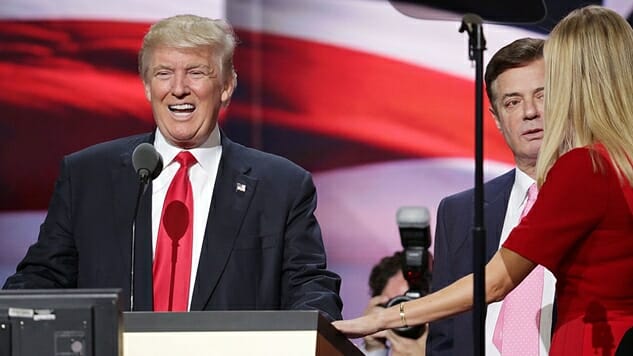Why Mueller’s Latest Indictment of Paul Manafort Should Worry Donald Trump
Photo by Chip Somodevilla/Getty
This afternoon, Special Counsel Robert Mueller delivered to the D.C. federal district court a superseding indictment that added more charges to the many counts already facing Paul Manafort, former campaign manager for Donald Trump. A superseding indictment fully replaces an earlier indictment. In this case, the previous indictment remained unchanged, but added two new charges — obstruction of justice and conspiracy to obstruct justice — and named a new defendant, Konstantin Kilimnik, a Russian-Ukrainian citizen, political consultant, and suspected former Kremlin intelligence operative. Kilimnik and Manafort were former business partners and worked together to shape Ukrainian politics in Russia’s interest.
The new charges indicate that Manafort and Kilimnik worked together in an effort to tamper with witnesses, an allegation Mueller leveled at Manafort earlier this week in an official request to revoke the former campaign manager’s $10 million bond and throw him in jail. Kilimnik is the 20th person Mueller has charged in his investigation of Russia’s interference in the 2016 election.
Though Trump isn’t named or directly implicated in the new charges, the subtext indicates he might be in a lot of trouble. Here are the three major takeaways that should worry Trump.
1. We know Mueller’s bar for obstruction charges.
There’s been a lot of debate over whether Trump obstructed justice. He says he didn’t, but spoiler: He did, and he continues to almost daily. Here are two breakdowns — here and here — of why this isn’t even up for debate, and those articles were from months ago. Trump’s dozens of self-owns since then have added to the list.
The charges in this indictment stem from Mueller’s accusation that Manafort tampered with witnesses earlier this year, allegedly asking them to lie on his behalf. That court filing from earlier this week says a witness told investigators that Manafort pressured them to commit perjury on his behalf regarding lobbying work they’d done for him in the states. Mueller’s new indictment took that filing up a level, and made it an official charge of obstruction of justice. The wording of these charges is what’s important.
For the first charge, Obstruction of Justice, the indictment alleges that Manafort and Kilimnik both “knowingly and intentionally attempted to corruptly persuade” two unnamed witnesses “with intent to influence, delay, and prevent the testimony of any person in an official proceeding.” The second charge, Conspiracy to Obstruct Justice, has the exact same wording, but instead of “attempted” it says “conspired.”
That’s it. That’s all it takes to get charged with obstruction of justice. Compare that to everything Trump and the gang have done over the past 18 months or so, and the evidence seems staggering. We even have several specific instances of the same offense Manafort and Kilimnik are now charged with, notably Trump’s personal attempts to shape and censure Congressional testimony of aides such as Steve Bannon, as well as his attempts to pressure intelligence chiefs (specifically former FBI Director James Comey, Director of National Intelligence Dan Coats, and NSA Director Admiral Mike Rogers) into denying in Congressional testimony that there was evidence of collusion between his campaign and Russia. None of them denied it.
-

-

-

-

-

-

-

-

-

-

-

-

-

-

-

-

-

-

-

-

-

-

-

-

-

-

-

-

-

-

-

-

-

-

-

-

-

-

-

-








































